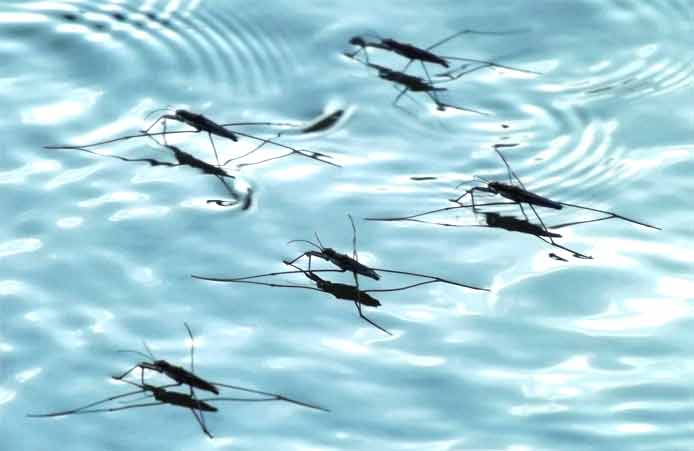In addition to being an unpleasant nuisance, mosquitoes can carry deadly diseases, such as West Nile virus, St. Louis encephalitis virus, and Dengue fever. These mosquito-borne infections have, in some cases, proven fatal, posing a risk to everyone, particularly those who work outdoors and in environments attractive to these insects. This includes individuals who work in the garage door repair industry.
Anaheim and Westminster Mosquitoes Tested Positive for St. Louis Encephalitis Virus
The summer and fall of 2019 have proven especially worrisome when it comes to mosquito-borne viruses. In October, 2019, KTLA 5 reported that mosquito samples from Anaheim and Westminster tested positive for St, Louis Encephalitis virus. It’s the first time this has occurred since 1987.
This rare and sometimes deadly infection causes fatigue, vomiting, nausea, and painful headaches in individuals who are bitten by infected mosquitoes. In severe cases, it can lead to devastating swelling in the brain, resulting in disability or even death. The effects tend to be more pronounced in older people.
Mosquitoes Test Positive for West Nile Virus in Orange and L.A. Counties
In addition to the aforementioned findings, in September 2019, KTLA 5 reported that mosquito samples taken from Orange County and Los Angeles County tested positive for the West Nile Virus. The virus is transmitted to both animals and humans through infected mosquito bites and remains the most common mosquito-borne disease in the United States.

4 people in Los Angeles County were among the 89 reported cases of West Nile infection throughout the country in 2019. Unfortunately, 2 individuals in California succumbed to West Nile virus-related illnesses. The report from KTLA includes a statement from the Greater Los Angeles County Vector Control District, emphasizing that ‘West Nile virus is endemic in Los Angeles County.’
Mosquito Awareness in Orange County
The Orange County Mosquito and Vector Control District (OCMVCD) is dedicated to informing Orange County residents about the best ways to protect themselves and their loved ones by taking steps to reduce mosquito-friendly environments. They emphasize the importance of conducting weekly property inspections and encourage residents to reach out with information about neglected swimming pools and deceased animals in the area.
The City of Los Alamitos and the OC Mosquito and Vector Control District collaborate with state public health agencies to educate and raise awareness among residents. This includes participating in the celebration of California’s Mosquito Awareness Campaign in 2017. Mary-Joy Coburn, who was the OCMVCD Public Affairs Coordinator at the time, highlighted, ‘Over the last few years, Orange County has experienced an increase in cases of mosquito-borne illnesses such as the West Nile virus.’
Laguna Woods Village, along with the cities of Garden Grove and Irvine, also contributed to mosquito awareness by publishing posts on their community news websites and papers during California Mosquito Awareness Week in April 2023. They emphasized the importance of preventing mosquito bites for community members. Additionally, Buena Park is one of the nine cities in Orange County with a historically high number of residents affected by West Nile Virus from mosquito bites, sharing useful insights on their website and through various local media channels.
Another campaign run by the Orange County Mosquito and Vector Control District called #MissionTipNToss encouraged residents to identify areas where mosquitoes may be breeding and take action by tipping the container over and tossing it away.
When Is the Active Season for Mosquitoes?
A study by academic institutions in Cyprus found that the highest mosquito activity was recorded in January, February, March, and April. The research indicated that temperature, humidity, and rainfall significantly influenced mosquito populations. Warmer temperatures and higher humidity correlated with increased mosquito numbers, with peak activity observed in March, which is the beginning of spring.
Mosquitoes are cold-blooded insects, and their activity tends to increase in warmer temperatures. Although they can still be present in cooler temperatures, they thrive in warm and wet environments because these conditions are favorable for their reproduction and development.
A wet spring season sets up ideal conditions for mosquitoes to breed. They only need an inch of standing water to lay their eggs, and a single female can lay as many as 200 eggs at a time. In just 24 to 48 hours, these eggs become larvae. It takes only a tiny puddle of water for mosquitoes to deposit their eggs, and shortly after, hundreds of baby mosquitoes will hatch. While rainwater can wash away mosquito eggs and larvae, mosquitoes have found ways to get around it and seek out spots where water can remain stagnant.
Mosquitoes are mostly active during dusk and dawn. Although extremely hot and dry weather conditions can make mosquitoes less active, the risk of West Nile virus becomes more pronounced in hotter weather. Therefore, a decrease in mosquito activity doesn’t necessarily correlate with a decreased risk of becoming infected from a single bite. In fact, it could mean that the chances of becoming infected are greater.
Mosquitoes and Garages
A study published by Cambridge University Press examined how mosquitoes react to temperature. The researchers found that both blood-fed and hungry females tend to avoid temperatures below 25°C (77°F), shedding light on the reasons why mosquitoes prefer to congregate in garages and environments with specific conditions, including humidity, warmth, darkness, and poor ventilation.
How Mosquitos Pick Their Prey
The Science Daily reported that female mosquitoes rely on various sensory cues to detect people they’ll bite, including moisture, body odor, and carbon dioxide. Researchers discovered that Ir8a, an olfactory co-receptor, plays a crucial role in attracting mosquitoes to humans. Matthew DeGennaro, a mosquito neurobiology researcher at Florida International University in Miami and one of the authors of the report, stated that ‘removing the function of Ir8a removes approximately 50 percent of host-seeking activity.’
This emphasizes the significance of masking this olfactory pathway. Insect-repelling products like DEET aim to achieve this to some extent. If these products can be further improved, people may no longer be desirable to mosquitoes, and the insects won’t be attracted to humans, seeking out other blood sources for their meals.
How to Protect Yourself During Garage Door Repairs
The Environmental Protection Agency provides useful tips for preventing mosquito bites. These include wearing the right clothing, such as long sleeves, pants, and socks. Shirts should be tucked into pants to eliminate any gap that could give insects access to your skin. Cover your ankles with high socks and wear proper footwear.
The CDC recommends using EPA-registered insect repellent, which can also be applied when staying in the garage or during garage door repair and installation work. The most effective repellents are those that use one of the following active ingredients:
- DEET
- Picaridin (known as KBR 3023 and icaridin outside the US)
- IR3535
- Oil of lemon eucalyptus (OLE)
- Para-menthane-diol (PMD)
- 2-undecanone
By covering up and using proper repellent products, you can significantly reduce your attractiveness to mosquitoes, and thus, reduce your chances of being bitten.
How to Control Mosquitoes in Your Garage and Environment
While we can’t eliminate mosquitoes altogether, we can make efforts to limit their populations. To be effective, the effort should target the insects at every stage and in various environments, both indoors and outdoors. The Michigan Department of Agriculture provides useful tips to control mosquitoes. They advise looking for spots where standing water may collect, such as trash cans, toys, garden equipment, birdbaths, tires, vehicle or pool covers, buckets, flower pots, etc.
Other areas to check outside and around the property include clogged rain gutters collecting water, flat roofs, boats, vehicles, and garden ponds or outdoor water features. Even a rain puddle or hollow tree stump can accumulate standing water. It only takes a small amount of water to make an ideal location for a female mosquito to lay her eggs. For areas that can’t be dumped or drained, use a larvicide. Other steps to take include:
- Filling in low spots with sand or dirt.
- Cleaning out gutters.
- Packing dirt into hollow tree stumps or holes in the yard.
- Use screens that tightly fit over windows and doors and promptly repair any holes.
- Allow for proper ventilation and airflow in the garage.
- Check for leaky pipes and faucets, particularly if laundry units are located in the garage.
- Trim back overgrown bushes, shrubs, and trees.
- Remove weeds in your garden and around the garage.
- Wear proper protective clothing when working.
- Avoid the use of scented colognes and perfumes.
- Use an EPA-registered mosquito repellent spray.
- Use yellow bug lights that are less attractive to insects.
Given the serious health risks associated with mosquito bites, taking proactive steps to control them in your environment can minimize the risk of being bitten by infected mosquitoes. Garages, by nature, are typically not air-conditioned or well-ventilated, creating a warmer and damper environment attractive to mosquitoes. Therefore, extra precautions should be taken when working in the garage or during garage door repair and installation projects to mitigate the potential health hazards associated with mosquito exposure.








Great piece of information, Thank you for sharing the updated one…